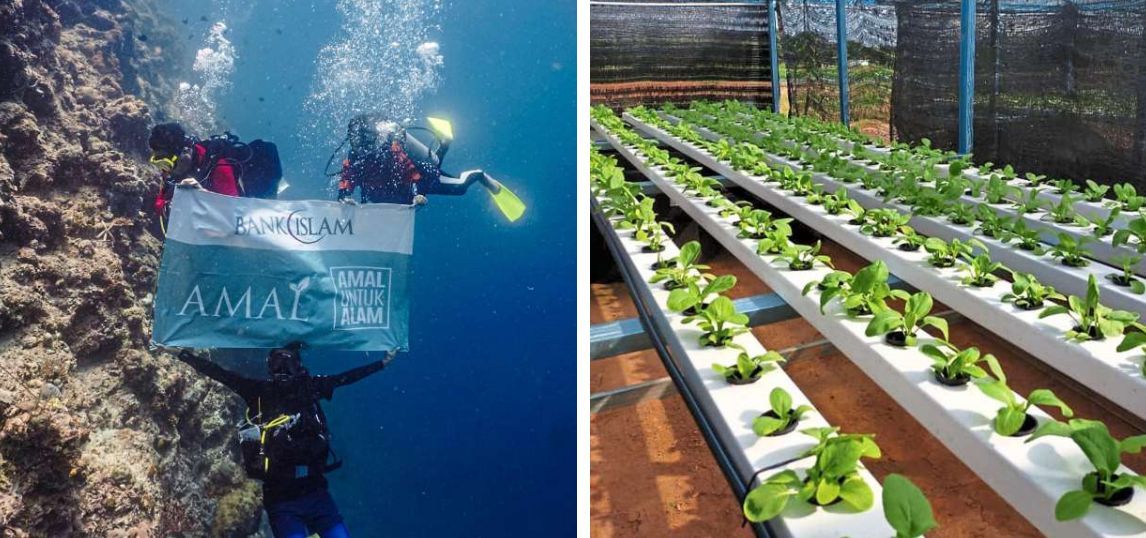Mohd Muazzam (left), representing the bank’s social responsibility arm AMAL, with Sedulur founder Abdul Rahman Nikman to mark the collaboration of the two parties to execute five initiatives to empower the community at Mabul Island, Semporna, Sabah.
Bank Islam’s ESG risk management framework to protect the well-being of people and the planet
AS part of Bank Islam Malaysia Bhd’s (Bank Islam) broader aspirations to be the leading Islamic financier in Malaysia, the bank has further demonstrated its commitment towards banking sustainability with the launch of its environmental, social and governance (ESG) risk management framework in late October this year.
Aimed at enhancing the bank’s board oversight on ESG and climate matters, the framework, which was initiated in the third quarter of 2021, is intended to introduce a fit-for-purpose ESG and climate risk management framework – a timely endeavour, as it comes ahead of the recently concluded November 2022 United Nations Climate Change Conference (COP27) in Egypt.
Bank Islam group chief executive officer Mohd Muazzam Mohamed said, “As part of our broader aspirations to be the champion in shariah-compliant ESG total financial solutions in Malaysia, we have implemented approaches to consider the ESG risk profile of our customers, as part of our financing origination process.
“This move aims to improve our customers’ sustainability, as it aligns with regulators’ key global and local efforts in building a resilient financial system.”
Positive values, positive impacts
Bank Islam will embed ESG risk considerations in its credit assessment process and leverage climate risk stress-testing to enhance its capabilities in addressing the impacts of climate change on the bank and its customers.
The move is a step forward in the right direction, as for financial institutions, in particular, Scope 3 emissions – otherwise known as financed or indirect emissions related to financial products and services such as loans – are the major contributor to the sector’s carbon footprint.
While the ESG risk management framework is in progress, Bank Islam has taken steps to assess new financing applications for ESG risks with elevated concerns on ESG based on industry-specific context.
Bank Islam has been among the pioneers in adopting Bank Negara Malaysia’s value-based intermediation (VBI) initiative since its introduction in 2018, which essentially champions sustainability practices as it focuses on creating positive value and impact on the economy, community and environment.
Taking a broader view, there are many similarities between VBI and ESG principles, most notably the focus on responsible stewardship and social inclusion.
As the nation’s largest provider of shariah-compliant financial products and services, Bank Islam ranks among Malaysia’s top leaders in social capital products.
The bank also aspires to double its shariah-ESG assets to RM4bil by the end-2025 from RM2.62bil recorded in June 2022, up 16.4% compared to RM2.
25bil in the same period last year, with its shariah-ESG funds expected to grow in tandem within the same period.
He adds, “Beyond developing our assessment scorecards and mechanisms for ESG and climate risk, we will also support our customers in their transition to low carbon development and contribute to Malaysia’s net-zero ambitions as part of their VBI initiatives.”
Championing ESG through VBI
Among the key drivers of Bank Islam’s ESG agenda is the bank’s investment arm BIMB Investment Management Bhd (BIMB Investment).
A leading shariah-ESG investment management company in Malaysia, BIMB Investment’s commitment is anchored in delivering risk-adjusted sustainable investment performance to investors.
For one, it is the first bank-backed Islamic asset manager in the region to be a signatory of the United Nations-supported Principles for Responsible Investment.
The investment management company has six shariah-ESG-compliant funds totalling over RM620mil assets under management (AUM) as of 30 September, with one of its flagship products being the BIMB-Arabesque i Global Dividend Fund 1 (BiGDF1).
This shariah-ESG global equity fund integrates Islamic values and ESG principles – while leveraging artificial intelligence, machine learning and big data technology – to deliver sustainable performance and potential risk-adjusted returns.
For its contributions and achievements in the region’s ESG, sustainability and asset management landscape, BIMB Investment has received many accolades over the years.
Most notably, it has been recognised as the ESG Asset Manager of the Year for the third time at the recent The Asset Triple A Award held in Kuala Lumpur.
Sustainable living in communities
Driven by ESG and VBI aspirations, Bank Islam is also going beyond offering financial products and services to uplift and empower local communities.
Its corporate social responsibility arm, AMAL Bank Islam (AMAL), recently rolled out a community service and sustainability programme at Mabul Island, Semporna, in Sabah.
It aimed to establish holistic, sustainable living in the community by incorporating green technology and eco-friendly applications and supporting its economy and welfare.
AMAL’s collaboration with the non-profit organisation Persatuan Kebajikan Sedulur (Sedulur) saw the implementation of five initiatives to empower the community.
The effort includes installing solar panels at a school for stateless children called Sekolah Saudara Borneo and constructing a new and proper sanitation system for the school and homes on stilts to protect the growth of seagrass and marine life in the designated area.
It partnered with ReefCheck Malaysia to gauge the effectiveness of the installed sanitation system by monitoring the condition of the seagrass and the biodiversity of marine life around Mabul Island.
To boost the local economy, AMAL also supplied equipment to local shopkeepers and small businesses around the island and upgraded the island’s community square, complete with solar lights, which acts as a central area for the community.
AMAL also went on to form a strategic partnership with Yayasan Sabah College of Technology (YSCT) to provide much-needed assistance to the Pusat (AMAL) Latihan dan Amali Orang Kelainan Upaya (OKU) Sabah in Tuaran, a training institute focused on enabling differently-abled individuals to acquire new skills to supplement their livelihood.
The bank provided cash contributions to assist in the rebuilding efforts for its carpentry workshop, which was damaged by a flood last year.
At the same time, YSCT provided a group of lecturers and student volunteers to aid in fixing the electrical and wiring of the centre, enabling the workshop to restart its operations.
Mohd Muazzam further said, “Bank Islam is committed to supporting projects that protect the prosperity of people and the planet.
Aligned with our vision as a bank that advances prosperity for all, we will continue to incorporate community empowerment and sustainability in all our business strategies while respecting planetary boundaries.”






